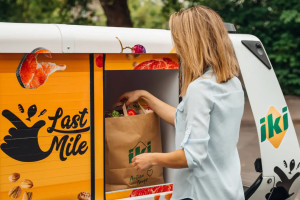‘Europe’s first autonomous delivery fleet’ operating in Vilnius

Clevon, a startup from Estonia, claims a European first in the field of autonomous delivery. Several driverless carriers from the company are navigating public roads, delivering groceries in the Lithuanian capital, Vilnius.
These driverless carriers, known as Autonomous Robot Carriers (ARCs), are serving IKI, a major supermarket chain in Lithuania. They are operated by LastMile, a local transportation platform.
Lockable compartments
Clevon’s driverless delivery robots have started providing daily commercial delivery services in the Vilnius city center area. Orders are collected at a central IKI store and then delivered directly to customers’ homes. ARCs can deliver seven customer orders in a single run. These robots have lockable compartments of various sizes suitable for both smaller and larger online grocery orders.
The autonomous carriers can deliver seven orders in a run
Significant advantage
Tadas Norušaitis, CEO and co-founder of LastMile, claims that for the first time in Europe, autonomous carriers are sharing the streets in the city center. He believes that these robots provide his company with a significant advantage in the delivery sector, saying: “Customers receive their goods quickly, even in the city center, and even during peak hours.”
Following a pilot program in a suburb and a successful introduction in Vilnius’ New Town and Old Town districts, it has been decided to expand autonomous delivery to other neighborhoods in the capital. The experiences so far have demonstrated that the robots can drive autonomously in various conditions, including rain, unpaved roads, snow, and puddles after rain.
Text message
Grocery chain IKI offers autonomous delivery free of charge. After placing an order, customers receive a text message informing them of the robot’s arrival time and a code to unlock its door. To ensure safety, the autonomous carriers travel at a maximum speed of 25 km/h. They are equipped with 360-degree cameras and special sensors and are supervised by teleoperators who monitor their driving in real-time.
The robots travel at a maximum speed of 25 km/h
Autonomous sorting robots
Autonomous transport movements are already common in fulfillment centers, with sorting robots taking over the work of people. Autonomous delivery vehicles on the streets have mainly been tested on a small scale until now.

Comments